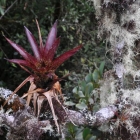When Gas Explodes
One Sky "The Canadian Institute of Sustainable Living" ,
is a nongovernmental organization located in northwest British Columbia near the proposed oil and gas fields of the Bowser and Sustut Basins. One Sky has been successfully working in the Niger Delta region of West Africa since 2002 on environmental capacity building with Nigerian non-governmental organizations (NGOs). Our work in the Niger Delta, an area known for its volatility, has been noted by international institutions, the Nigerian government and independent reviewers for successfully building regional coalitions and cooperative working models among NGOs, communities, government and business. Known as a "Type II partnership", our efforts to develop solutions that include all three sectors of society in an integrated approach have met with considerable success despite Nigeria's reputation for conflict. Given our experience in the Niger Delta region, our working knowledge of Northern B.C. and our unique understanding of these two contexts, we have produced this report on the potential for resource conflict regarding the acquisition of Shell Canada by Royal Dutch Shell. The report includes recommendations for avoiding resource conflict in a potentially explosive region of Northern B.C.
Brazil of the North
Ten years ago, British Columbia was dubbed the "Brazil of the North" and an international movement to save its temperate rainforests emerged with such force and conviction that it resulted in the largest mass arrests and civil disobedience in Canadian history. Over eight hundred people were arrested, thousands took part in blockades, and valleys both fell and were protected in a "war of the woods". It left companies and shareholders shaking their heads, First Nations barricading traditional lands, environmentalists hanging in trees and the courts jammed with paperwork. The fight began over the coastal temperate rainforests of Clayoquot Sound, long considered to be the jewels of Canada's West Coast and quickly spread to include the whole B.C. coastline including the now protected "Great Bear Rainforest". For the companies it was a nightmare. Business as usual became business through negotiation. Nobody could have predicted the sophistication of the various players. Trans-border alliances were created, international media summoned via satellite and internet, and focused market campaigns initiated in Europe that left Canadian companies stunned by the global capacity of the "green" movement. The net result, a completely different way of doing business and a latent environmental movement capable and ready to fight.
Delgaamukw
British Columbia, unlike many parts of Canada, never signed treaties with the 27 distinct First Nations that have lived here for millennia. British Columbia is also relatively young with little over a century to have worked out a relationship with First Nations. At first decimated by disease and later devastated by the residential school system, British Columbia’s native population have only recently begun to recover from a federal legal framework that denied them access and control over traditional lands. But the era of building dams, logging forests and mining minerals without consulting First Nations came to an abrupt legal end in the 1990s with the Supreme Court decision regarding Delgaamukw. Located in the far north of British Columbia, adjacent to the oil and gas interests of Royal Dutch Shell, the Gitxsan and Wet'suwet'en First Nations successfully established their legal right to control their lands and resources. No longer under the overt control of government, First Nations now negotiate and do business nation-to-nation with Canada and the Province. The private sector has taken note and few business deals are broached anymore without first consulting British Columbia's First Nations.
Read more. DOWNLOAD the report >whengasexplodes_web.pdf

